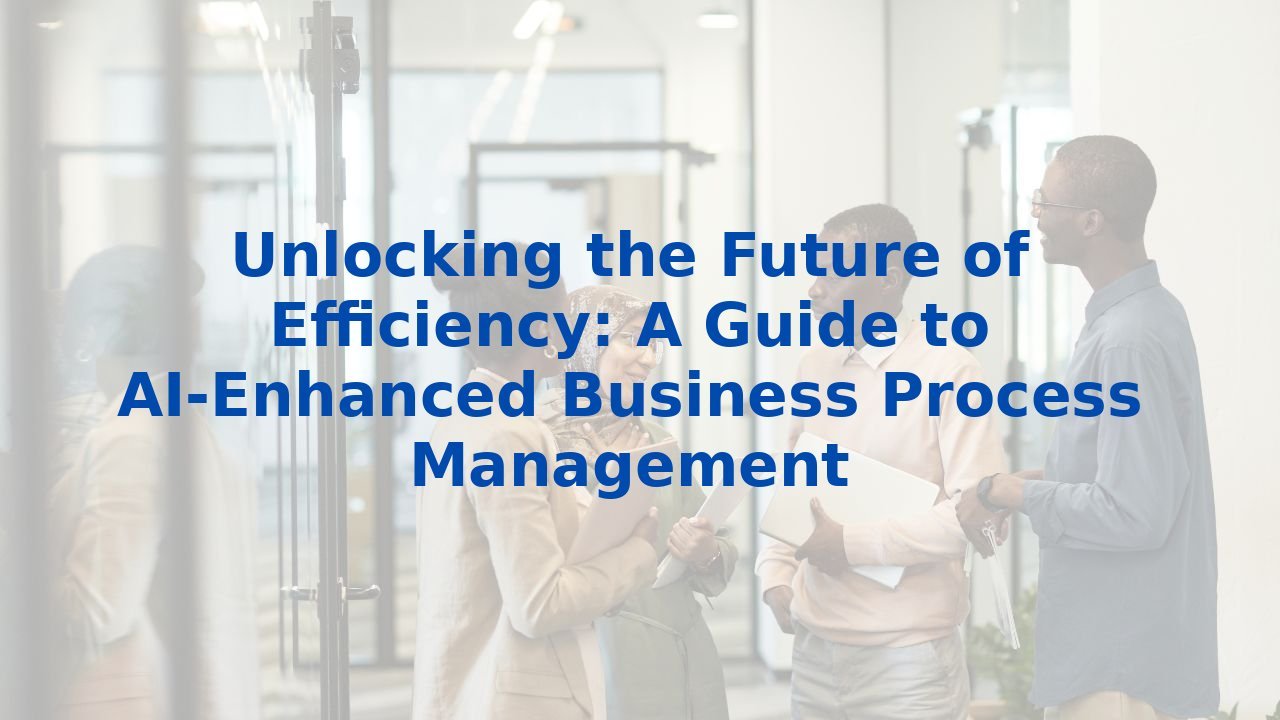Unlocking the Future of Efficiency: A Guide to AI-Enhanced Business Process Management
Unlocking the Future of Efficiency: A Guide to AI-Enhanced Business Process Management
In the relentless pursuit of operational efficiency, businesses find themselves at a crossroads where tradition meets innovation. With Artificial Intelligence (AI) rapidly transforming the landscape of Business Process Management (BPM), it is imperative for organizations to understand how to harness this powerful tool. Let's explore the multifaceted ways AI can enhance business processes and why investing in employee training is essential for navigating this evolution.
1. Process Discovery and Mapping
At the core of effective BPM lies the ability to accurately understand and document existing processes. Traditional methods often involve manual data collection and interviews, which can be both tedious and imprecise. Enter AI. By employing process mining and pattern recognition techniques, AI can swiftly uncover the intricacies of existing workflows. This data-driven approach ensures that organizational maps are not only up-to-date but also comprehensive—laying a robust groundwork for optimization.
2. Process Automation
Once processes are mapped out, the next logical step is automation. AI can execute routine tasks—like data entry, document processing, and administrative functions—that previously consumed valuable time and resources. With automation in place, organizations experience a dual benefit: increased speed and significantly reduced errors. This shift allows employees to shift their focus to more strategic initiatives—ultimately enhancing overall productivity.
3. Real-Time Monitoring and Improvement
AI’s capabilities extend beyond mere automation. Continuous monitoring of business processes in real-time enables organizations to detect potential issues before they escalate. By leveraging historical data and AI-driven insights, businesses can identify anomalies and implement corrective actions without delay. This proactive approach contributes to an environment of continuous improvement—ensuring processes evolve over time to meet changing demands.
4. Enhanced Decision-Making
Decisions shape the direction of any organization, and AI enhances this critical aspect significantly. By analyzing vast amounts of structured and unstructured data, AI can simulate various scenarios, predict outcomes, and highlight key root causes of issues. Access to comprehensive insights empowers decision-makers, allowing them to mitigate risks and craft strategies based on solid evidence rather than intuition.
5. Predictive Analytics and Risk Management
Predictive analytics play a pivotal role in anticipating future business outcomes. AI examines historical data to discern patterns and trends, which in turn helps organizations preemptively address bottlenecks and delays. By swiftly adapting to market fluctuations, businesses can maintain a competitive edge and navigate the intricacies of risk management more effectively.
6. User Experience and Employee Training
A seamless user experience is paramount in BPM software, and AI is pivotal in this transformation. With more intuitive interfaces empowered by AI, users can manage and optimize processes with relative ease. However, this shift also underscores the necessity of training employees in AI applications. Understanding data analysis, pattern recognition, and decision-making techniques prepares the workforce to thrive in an AI-driven environment. Customized training programs can equip your entire workforce with essential AI skills, ensuring they can leverage the potential AI has to offer in BPM.
Benefits of AI in BPM
The intersection of AI and BPM yields an array of advantages that enhance organizational efficiency:
- Improved Productivity: Automation reduces the burden of routine tasks, allowing teams to focus their efforts on core business objectives.
- Reduced Costs: AI-driven automation results in lower operational expenses due to minimized labor requirements.
- Enhanced Decision-Making: Data-driven insights lead to more informed decisions, reducing risks and enhancing strategic alignment.
- Increased Efficiency: Real-time monitoring ensures ongoing optimization of processes, thereby elevating efficiency levels.
- Better Customer Satisfaction: The speed and accuracy AI brings to processes translate into improved experiences for clients and customers alike.
Conclusion
The integration of AI into Business Process Management is not merely a trend; it is a transformative leap towards operational efficiency. By leveraging AI in process discovery, automation, real-time monitoring, and predictive analytics, organizations can streamline operations and bolster decision-making. Furthermore, investing in employee training is not just beneficial—it is essential for unlocking the full potential of these advanced tools. As the business landscape continues to evolve, embracing AI in BPM is crucial for maintaining agility and competitiveness in an ever-shifting market.



